Curriculum
Evolve’s innovative and well thought out curriculum areas are carefully designed to engage, inspire and unlock your little one’s unique potential. Rich in learning opportunities, and crafted around children’s specific interests, our age-appropriate programmes encourage a love of learning that will set children up for life.
Our ECE curriculum sets goals and plans for children to acquire skills and knowledge through experiences and opportunities. This provides the curriculum foundation necessary for high quality care and addresses the individual needs of each child. Having daily routines, providing self-help and life-skill development are part of a child’s day. Children are always learning, and it is important to recognise that the programme provides learning experiences for all development domains.
Our focus areas are:
Spontaneous play - Tākaro Noa
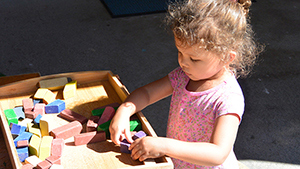 At Evolve, we are firm believers that a child’s work is play. Throughout each day our children are presented with invaluable opportunities to direct and lead their own learning, based around their current interests.
At Evolve, we are firm believers that a child’s work is play. Throughout each day our children are presented with invaluable opportunities to direct and lead their own learning, based around their current interests.
Free play includes unstructured, child-initiated activities that allow children to develop their imaginations while exploring and experiencing the world around them. Spontaneous play comes naturally from children’s curiosity, discovery and enthusiasm.
Intentionally planned activities - Whakarite ngohe
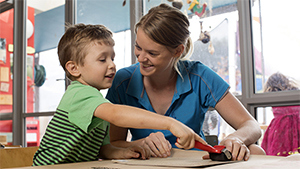 Our centres offer the ideal balance of child-led and teacher-led experiences. Each day our expert teachers will set up an exciting and challenging array of experiences to engage your little one and build their skills in a fun and supportive environment.
Our centres offer the ideal balance of child-led and teacher-led experiences. Each day our expert teachers will set up an exciting and challenging array of experiences to engage your little one and build their skills in a fun and supportive environment.
With children varying in their abilities and needs cognitively, socially, emotionally and physically, having a flexible approach to teaching and learning – including free and guided play - is essential. This provides well-balanced information for assessment and planning.
Bicultural practice - Mahi Kākanorua
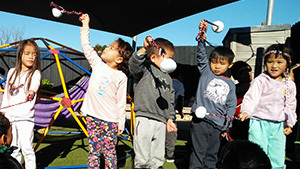 We value and respect cultural identity and recognise and celebrate New Zealand’s dual heritage. Our commitment to te Tiriti o Waitangi guides our tikanga and te reo Māori practices for an authentic commitment to Te Ao Māori.
We value and respect cultural identity and recognise and celebrate New Zealand’s dual heritage. Our commitment to te Tiriti o Waitangi guides our tikanga and te reo Māori practices for an authentic commitment to Te Ao Māori.
Physical activity - Korikori
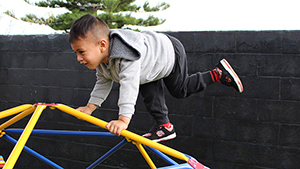 The natural process of early childhood learning and development begins with the body. Movement primes the brain for learning, fostering the neural pathways that form the foundations for cognitive, physical, emotional and spiritual learning. Physical activity builds the body for health and wellbeing, the brain for learning and the confidence to face and conquer challenges.
The natural process of early childhood learning and development begins with the body. Movement primes the brain for learning, fostering the neural pathways that form the foundations for cognitive, physical, emotional and spiritual learning. Physical activity builds the body for health and wellbeing, the brain for learning and the confidence to face and conquer challenges.
Evolve’s purpose-built early learning centres feature fantastic outdoor spaces where children can swing, climb, run, jump, and build their physical skills. From dancing and yoga, to playball and bike riding, our indoor and outdoor physical experiences are designed so your child can have fun while developing all the skills they need to thrive.
Water play - Tākaro wai
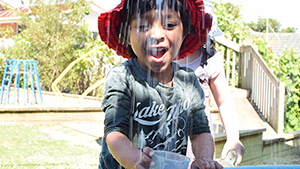 Ask any child under 5 what their favourite activity is, and the chances are, they’ll shout out “water play”! At Evolve, our teachers enjoy this almost as much as our children, and during the summer months many happy times are spent sprinkling, sloshing, squirting and splashing. Waterplay gives many opportunities to develop fine and gross motor skills across the ages. Water is a natural material that provides hours of fun, development and learning opportunities. Children benefit from the relaxing and repetitive nature of scooping, pouring and running their hands through the water.
Ask any child under 5 what their favourite activity is, and the chances are, they’ll shout out “water play”! At Evolve, our teachers enjoy this almost as much as our children, and during the summer months many happy times are spent sprinkling, sloshing, squirting and splashing. Waterplay gives many opportunities to develop fine and gross motor skills across the ages. Water is a natural material that provides hours of fun, development and learning opportunities. Children benefit from the relaxing and repetitive nature of scooping, pouring and running their hands through the water.
Messy play - Korihori pōrohe
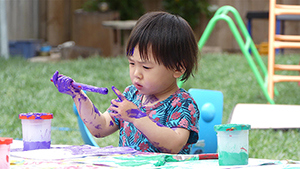 Messy play gives children the opportunity to experience a wide range of sensory experiences such as finger paint, slime and gloop. Sensory play supports language development, cognitive growth, fine and gross motor skills, problem solving and social interaction. Squishing and squeezing can help pre-writing skills and gives children the freedom to explore and have fun.
Messy play gives children the opportunity to experience a wide range of sensory experiences such as finger paint, slime and gloop. Sensory play supports language development, cognitive growth, fine and gross motor skills, problem solving and social interaction. Squishing and squeezing can help pre-writing skills and gives children the freedom to explore and have fun.
Sand play - Kirikiri
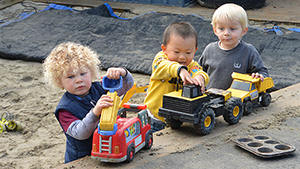 What child doesn’t enjoy a trip to the beach or having fun in the sandpit? Sand play is fantastic in aiding development by improving the coordinative, interactional and creative aspects of your child’s brain. Sand play promotes creativity and imagination, brings delight and develops social competence. The repetition of filling up a bucket and tipping it out over and over is about perseverance and skill. Children learn strategies for active exploration, thinking and reasoning. Sand play even helps develop basic math and science concepts such as exploring, estimating, experimenting, measuring and constructing.
What child doesn’t enjoy a trip to the beach or having fun in the sandpit? Sand play is fantastic in aiding development by improving the coordinative, interactional and creative aspects of your child’s brain. Sand play promotes creativity and imagination, brings delight and develops social competence. The repetition of filling up a bucket and tipping it out over and over is about perseverance and skill. Children learn strategies for active exploration, thinking and reasoning. Sand play even helps develop basic math and science concepts such as exploring, estimating, experimenting, measuring and constructing.
Literacy and numeracy - Reo matatini/Reo Pangarau
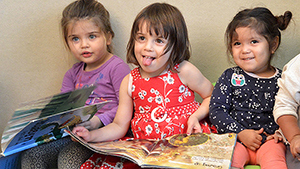 Literacy and numeracy skills are woven throughout all aspects of our curriculum to ensure that by the time your child leaves our centre, they have gained the literacy and numeracy skills they need to succeed in the next stage of their learning journey - primary school. Literacy and numeracy skills are the foundation for continuing learning and provide access to other parts of the curriculum. Literacy is learning to communicate. It is important children have a broad and open-ended environment where literacy is embedded into everyday activities. Numeracy is about counting, sorting, pattern making, sequencing, size, weight and volume. Math can be found and supported in every area of play, fun and repetition.
Literacy and numeracy skills are woven throughout all aspects of our curriculum to ensure that by the time your child leaves our centre, they have gained the literacy and numeracy skills they need to succeed in the next stage of their learning journey - primary school. Literacy and numeracy skills are the foundation for continuing learning and provide access to other parts of the curriculum. Literacy is learning to communicate. It is important children have a broad and open-ended environment where literacy is embedded into everyday activities. Numeracy is about counting, sorting, pattern making, sequencing, size, weight and volume. Math can be found and supported in every area of play, fun and repetition.
Music - Waiata
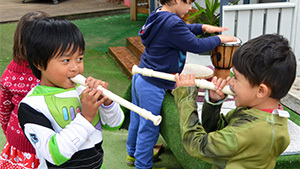 Introducing children to music at an early age can kick start their learning and offer lifelong benefits. Listening to music and participating in musical experiences forges neural connections which will help your child in almost every area of their learning, including rhythms and rhymes, language development, maths and reading. An integral part of our programme, music also provides an opportunity to dance, sing and learn about different cultures.
Introducing children to music at an early age can kick start their learning and offer lifelong benefits. Listening to music and participating in musical experiences forges neural connections which will help your child in almost every area of their learning, including rhythms and rhymes, language development, maths and reading. An integral part of our programme, music also provides an opportunity to dance, sing and learn about different cultures.
Our environment - To tātou taiao
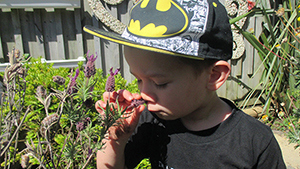 It has never been more important than now to take care of our environment, and here at Evolve we take great pride in teaching our children to love, respect and care for the world around us. Our natural environments connect children with nature. We encourage recycling, teach them about sustainability, and many of our centres have composts, worm farms and even their own vegetable gardens which our children plant and tend.
It has never been more important than now to take care of our environment, and here at Evolve we take great pride in teaching our children to love, respect and care for the world around us. Our natural environments connect children with nature. We encourage recycling, teach them about sustainability, and many of our centres have composts, worm farms and even their own vegetable gardens which our children plant and tend.
We believe the natural world is the ultimate teacher. Children develop a sense of respect and caring for the natural environment during the early years and this gives them a sense of wonder and joy of discovery. Children show appreciation and respect for natural environments and other things living in it. Having opportunities to be outside or learning about the way their world works intrigues children and they want to be involved and take part when they can.
Family and dramatic play - Ngā whakaari ā-whānau
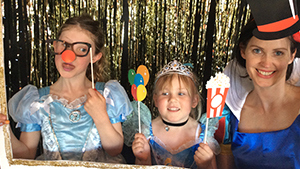 Family and dramatic play provides invaluable opportunities for children to express their feelings, ignite their imagination, and build empathy and understanding. By acting out different roles, children learn valuable real life skills such as communication, sharing, and caring for others.
Family and dramatic play provides invaluable opportunities for children to express their feelings, ignite their imagination, and build empathy and understanding. By acting out different roles, children learn valuable real life skills such as communication, sharing, and caring for others.
Dramatic play is a great way for children to learn to self-regulate their emotions and actions. It is a type of play where children accept and assign roles, and then act them out. They break through the walls of reality, pretend to be someone or something different from themselves. Children have the freedom to express their feelings through dramatic play, through toys, props and materials.
Building and construction - Wāhi hangahanga
The building area. Connecting and transportation is on a rise in our whare so we really needed to re-think this one on how we can accommodate the varying interest and ideas of our children to build on what they know and help them refine their working theories about the physical and wider world they live in. So it made sense to us from observations that we needed to relocate the animal setup and create what is now the construction influence scene surrounded with New Zealand signs and real-life images. We added work helmets, levellers, safety gloves binoculars and will continue to add more resources so they can role play as they build together. Big space here to fill with their own creations.
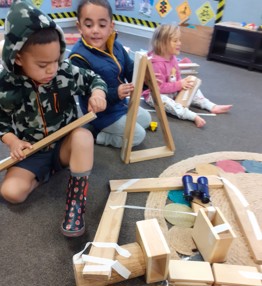
Technology - Hangarau
Technology provides opportunities for learning at all levels of education – and this journey starts in early childhood. Digital resources can create interactive environments where children are engaged in mastering specific skills at their own pace. Technology plays a positive role in children’s learning and development and it provides an active learning environment for children. Teachers play a vital role in ensuring children use technology in a safe way that contributes to the diverse learning that is valued.
